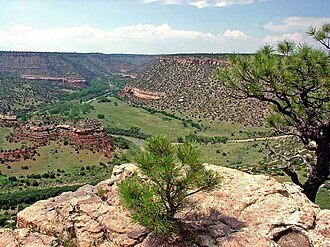Canadian River
Canadian River is a significant river in the Southwestern United States, originating in the Rocky Mountains of Colorado, flowing through the Panhandle region of Texas, and continuing through Oklahoma to its confluence with the Arkansas River near the town of Muskogee, Oklahoma. With a length of approximately 906 miles (1,458 kilometers), it is the longest tributary of the Arkansas River and plays a crucial role in the ecosystems, water supply, and recreational activities of the regions it traverses.
Course
The Canadian River originates in the Sangre de Cristo Mountains of Colorado, then meanders southeast into New Mexico, where it serves as a vital water source for the arid landscape. In New Mexico, the river flows through a series of deep canyons and gorges, notably the Canadian River Canyon, offering spectacular scenery and opportunities for outdoor recreation. After crossing into the Texas Panhandle, the river's path becomes more easterly, eventually turning northeast as it enters Oklahoma, where it ultimately joins the Arkansas River.
Hydrology
The Canadian River's flow varies significantly across its course, influenced by seasonal rainfall, snowmelt in its upper reaches, and water withdrawals for agricultural and municipal use. The river also receives water from several tributaries, including the North Canadian River, South Canadian River, and Cimarron River, which contribute to its flow and hydrological complexity.
Ecology
The Canadian River supports diverse ecosystems along its length, from alpine forests in its headwaters to arid plains and woodlands in its middle and lower sections. This diversity of habitats makes the river corridor a haven for wildlife, including various species of fish, birds, and mammals. Conservation efforts are ongoing to protect these ecosystems and the species that depend on them, particularly in areas impacted by human activity and water diversion.
Human Use and Impact
The Canadian River has been a vital resource for human communities for thousands of years, providing water for irrigation, domestic use, and industry. Today, it continues to be a critical water source, though challenges such as pollution, overuse, and habitat destruction pose threats to its health and sustainability. The river also offers recreational opportunities, including fishing, boating, and hiking, contributing to the local economies of communities along its course.
Management and Conservation
Efforts to manage and conserve the Canadian River involve multiple stakeholders, including state and federal agencies, local governments, and non-profit organizations. Initiatives focus on improving water quality, restoring habitats, and ensuring sustainable water use practices. The Canadian River Compact, an agreement between Colorado, New Mexico, Texas, and Oklahoma, is a key tool for managing the river's resources collaboratively across state lines.
See Also
Transform your life with W8MD's budget GLP-1 injections from $125.
W8MD offers a medical weight loss program to lose weight in Philadelphia. Our physician-supervised medical weight loss provides:
- Most insurances accepted or discounted self-pay rates. We will obtain insurance prior authorizations if needed.
- Generic GLP1 weight loss injections from $125 for the starting dose.
- Also offer prescription weight loss medications including Phentermine, Qsymia, Diethylpropion, Contrave etc.
NYC weight loss doctor appointments
Start your NYC weight loss journey today at our NYC medical weight loss and Philadelphia medical weight loss clinics.
- Call 718-946-5500 to lose weight in NYC or for medical weight loss in Philadelphia 215-676-2334.
- Tags:NYC medical weight loss, Philadelphia lose weight Zepbound NYC, Budget GLP1 weight loss injections, Wegovy Philadelphia, Wegovy NYC, Philadelphia medical weight loss, Brookly weight loss and Wegovy NYC
|
WikiMD's Wellness Encyclopedia |
| Let Food Be Thy Medicine Medicine Thy Food - Hippocrates |
Medical Disclaimer: WikiMD is not a substitute for professional medical advice. The information on WikiMD is provided as an information resource only, may be incorrect, outdated or misleading, and is not to be used or relied on for any diagnostic or treatment purposes. Please consult your health care provider before making any healthcare decisions or for guidance about a specific medical condition. WikiMD expressly disclaims responsibility, and shall have no liability, for any damages, loss, injury, or liability whatsoever suffered as a result of your reliance on the information contained in this site. By visiting this site you agree to the foregoing terms and conditions, which may from time to time be changed or supplemented by WikiMD. If you do not agree to the foregoing terms and conditions, you should not enter or use this site. See full disclaimer.
Credits:Most images are courtesy of Wikimedia commons, and templates, categories Wikipedia, licensed under CC BY SA or similar.
Contributors: Prab R. Tumpati, MD



